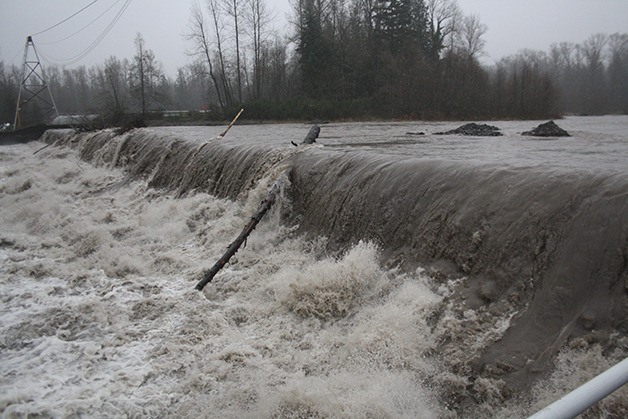With the unexpected rainfall last Tuesday, the White River was nearly three feet away from flowing over the flume gates and down through the flume construction project.
This was a problem for Cascade Water Alliance Lake Manager Joe Mickelson, who was overseeing the replacement of the flume that fed water into Lake Tapps. Nearly 2,400 feet of century-old, rotted wood is being replaced by high-tensile concrete to withstand the river’s erosive power.
“The river was at 1,800 cubit feet of water per second, and now it is at 3,800,” Mickelson said, explaining how the unexpected rainfall caused the water to quickly rise. “I can’t have the water get any higher than that. We can’t have it go over the flume or it will wipe out the project.”
Although Mickelson was worried about the water levels, he said it was not an emergency, and he expected his workers to be able to keep the water from flowing down into the project site.
The replacement of the flume is one of the many projects Cascade Water Alliance is attempting to finish before spring. Other projects include weeding the lake bed and replacing the head gates that control how much water enters and leaves the lake.
In order to perform these numerous inspections and repairs, Cascade started lowering the lake water levels in November until the lake was almost completely empty of water.
The lake elevation is just over 500 feet, nearly 43 feet lower than when the lake was at its highest levels earlier this summer. This is the lowest the lake has been since 2003.
One of the reasons Cascade is replacing the wood in the flume as well as the wooden fish barrier in the river is because the rotted wood is injuring fish that swim up and down the river, especially salmon that use the river to return to their spawning waters.
In fact, according to Mickelson, the White River is one of the 10 worst rivers in the state of Washington because of the Mud Mountain Dam. “The damn is holding fish, so they have to use a fish trap and take the fish and put them in trucks and haul them up,” said Mickelson. “The dam is in such bad repair, it is compromising the safety of the fish.”
At the fish barrier in Buckley, salmon and trout are trapped, boxed, and shipped upstream past the dam to spawn.
Further downstream, fish caught in the flume are diverted and sorted back into the river, and rock chutes do the same thing for mud and rocks.
Mickelson said that Cascade’s goal is to only take water from the river, and to keep as much fish and debris in the river and out of the lake as possible.
Cascade plans to begin filling Lake Tapps by March, and have it completely filled again by May.


